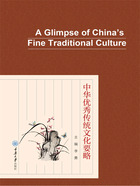
Chapter 2 Lao Zi: The Founder of Taoism
If Confucianism was the mainstream of Chinese thought for about 2,000 years, then the second deepest influence on Chinese thought was no doubt Taoism, which opposed but supplemented and enlivened Confucianism.

Lao Zi, the founder of Taoism, was born in the State of Chu (楚), in present-day Henan Province, a little earlier than Confucius. His family name was Li, his given name was Er and his nickname was Lao Dan (老聃). He lived during the Spring and Autumn Period. Due to his great learning, even Confucius was said to have traveled miles to consult him. According to Records of the Grand Historian (《史记》) by Sima Qian, Lao Zi was a librarian or archivist in the royal court, in charge of the archival records of Zhou Dynasty. Seeing the decline of the Zhou Dynasty, he quit his job to live in seclusion. On his way he reached a gate which he had to go through. Yin Xi (尹喜), the gate keeper, begged him to write a book. Lao Zi agreed and wrote about 5,000 words on Dao (道) and De (德), or the Way and its Virtue. The book is called Dao De Jing (《道德经》), or Classic of the Way and Its Virtue, but more commonly known as Lao Zi (《老子》). The philosophy interpreted in it is described as Taoism, for Tao, not Dao, which was how the Chinese word was represented in English in the past.
The book of Lao Zi consists of just about 5,000 Chinese characters, and contains 81 chapters which are divided into two parts, namely Dao and De. Short as it is, the book has played a significant role in the development of Chinese culture. It became the basis of Taoism, the school of philosophy parallel to Confucianism in ancient China. The thought of Lao Zi formed the foundation of the Taoist religion, the most influential indigenous school of religion in China. It has also had a direct impact on the characteristics, trends of thought and aesthetic sensibilities of the Chinese nation. The classic is written in verse, in very succinct language, with many lines capable of different interpretations. It has been translated into many foreign languages and modern Chinese. It was first introduced into Europe, possibly as early as the 15th century, and has been one of the most translated philosophical works of ancient China. Indeed, few books have attracted as much attention and aroused as much interest in China and abroad as the Dao De Jing (《道德经》), which has won Lao Zi the title of World Cultural Celebrity. Many of Lao Zis enlightening views are based on his philosophy of Dao, naturalness (自然), non-action (无为), and non-contention (不争).